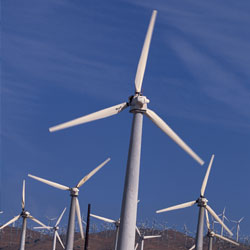 The U.S. has accused China of providing unfair subsidies to Chinese wind power equipment manufacturers. As a result, the Office of the U.S. Trade Representative (USTR) has requested a World Trade Organization (WTO) dispute settlement with the government of China.
The U.S. has accused China of providing unfair subsidies to Chinese wind power equipment manufacturers. As a result, the Office of the U.S. Trade Representative (USTR) has requested a World Trade Organization (WTO) dispute settlement with the government of China.
The dispute involves a program called the Special Fund for Wind Power Manufacturing, under which the USTR says China provides subsidies that are prohibited under WTO rules. These grants apparently hinge on Chinese wind power equipment manufacturers using components made in China, according to U.S. Trade Representative Ron Kirk.
‘Import substitution subsidies are particularly harmful and inherently trade-distorting, which is why they are expressly prohibited under WTO rules,’ said Kirk in a statement. ‘These subsidies effectively operate as a barrier to U.S. exports to China.’
Rob Gramlich, senior vice president for public policy at the American Wind Energy Association, says that export promotion is important for the U.S. wind industry.
‘The U.S. has led the world in the past in large turbine manufacturing, and we still lead in small turbine manufacturing and exports,’ he says. ‘Along with stable domestic policies, our role as a global exporter of wind turbines relies on a level playing field in international markets. Any practice that tilts the global playing field unfairly would be of serious concern to our members who want to play a role in China, which has become the world's largest wind market.’
Grants available under China's Special Fund for Wind Power Manufacturing range from $6.7 million to $22.5 million. Chinese wind turbine and component manufacturers can receive multiple grants, according to the USTR.
The Chinese Commerce Ministry stated that it would study the U.S. requests for consultations and that its policies were ‘in keeping with WTO rules,’ Reuters reports.
USTR's actions stem from an investigation initiated by the organization in response to a petition filed by the United Steelworkers (USW) in September.
‘Trade policy is a two-way gig and often it is not understood that access to China's market is equal or of paramount importance, particularly if you look at the cumulative trade deficit,’ Gary Hubbard, spokesperson for the USW, told NAW.
The USW filed a 5,800-page case under Section 301 of the Trade Act of 1974 concerning the following five areas:
– Restrictions of access to critical materials;
– Prohibited subsidies contingent on export performance or domestic content;
– Discrimination against imported goods and foreign firms;
– Technology transfer requirements for foreign investors; and
– Trade-distorting domestic subsidies.
Some of these concerns were addressed during meetings of the U.S.-China Joint Commission on Commerce Trade, which took place Dec. 14-15. China agreed to change its requirement that foreign enterprises have prior experience supplying wind power equipment to large wind projects in China.
During its Section 301 investigation, the USTR obtained clarification that two Chinese subsidy programs, the Export Research and Development Fund program and the Ride the Wind program, had been terminated.
The USW praised the USTR's actions, but is unsure how China will deal with the issue.
‘'Trust but verify' is an apt phrase to use when evaluating promises made by the Chinese,’ said Leo W. Gerard, USW's president, in a statement.’ We cannot afford to simply accept more empty promises, hoping that the Chinese will keep their word. Trade enforcement must be a higher priority in our nation's policy agenda, and it needs to be backed up by sufficient resources and manpower to help us reignite economic growth, production and job creation here at home.’



